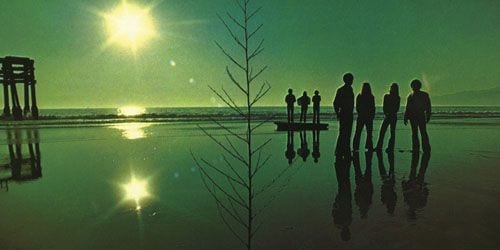
According to the conventional wisdom, Motown died after relocating from Hitsville, U.S. A. in Detroit to the golden shores of Los Angeles during the late ’60s/early ’70s. While it is true that the classic Motown songwriting and production formulas changed, this had much more to do with the changing times than the geographical shift. Motown still released strong albums by some of its most established and identifiable artists, including Marvin Gaye (What’s Going On in 1971, Let’s Get it On in 1973) and Stevie Wonder (Music of My Mind in 1972, Talking Book in 1972, and Innervisions in 1973). These albums may not fit the mold of the label once known for danceable teen love anthems, but these critically acclaimed discs were critically heralded at the time as classic records, and their reputations have only grown over the years.
One of Motown’s strangest ventures was the poppy, psychedelic funk of the subsidiary MoWest label. The label released more 40 singles and almost a dozen albums during its two year tenure between 1971 and ’73. MoWest didn’t have any big hits, and the music hasn’t been available for years. That’s recently changed, thanks to a recently released 16-track anthology. While there may not be any great revelations — the music is uniformly solid, and even groovy. But there’s a sweetness to the singles. Even if the songs are trying to be heavy, they do so with a feathery touch.
Consider Lodi’s “I Hope I See it in My Lifetime”. Its theme of “We are all in it all together” is expressed with a hippie smile. The simple instrumentation and freaky flourishes suggest a better day rather than represent the current political and cultural crises of the day. Syreeta’s “Black Maybe” offers a more challenging look at what was happening in terms of race, but as the title suggests, she does not offer a strong point of view. Her vocals are wrapped in lush instrumentation that befits lyrics about a woman needing to wipe her man’s tears away more than changing the society in which she lives.
One could argue about the song selections here, but no assortment could really provide a complete picture. The cuts chosen do offer many aural pleasures, often to a danceable beat, such as Frankie Valli and The Four Seasons’ “Sun Country”. Yes, it is that New Jersey boy singing about the shine of the other coast, but the chunky guitar riffs and horn arrangements suggest that he too listened to The Beach Boys. And the tracks by the band The Sisters Love make you wonder why the band never hit it big. Their sexy vocals on Curtis Mayfield’s “Give Me Your Love” make you feel the urgency of their passion. And their Willie Hutch-produced rendition of Hutch’s “You’ve Got to Make the Choice” offers a gritty take on the age old question, “Her or me — who is it gonna be?”
The sound quality of these old sides reveal the limitations of the recording process of the time — the excess compression and blending of instruments — but this again is part of the charm. One can tell from the first notes of each song that these tracks are from another era, but the music still comes off as clean and shiny. Take the title cut, Odyssey’s (not the disco group) “Our Lives Are Shaped By What We Love”. There are no silences on the three-and-a-half-minute track — because back then one would hear the quiet as tape hiss or surface noise on the record. So there’s always a percussion fill or another instrument rhythmically playing. One can hear each note.
This anthology may not have you searching the crates for the more obscure releases, but the music does provide good listening and an aural glimpse into a previous era when the sound of the Motor City moved West. Those were weird times, and the music on this disc reflects this eccentricity in an entertaining way.

![Call for Papers: All Things Reconsidered [MUSIC] May-August 2024](https://www.popmatters.com/wp-content/uploads/2024/04/all-things-reconsidered-call-music-may-2024-720x380.jpg)



